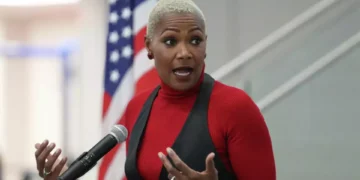Aug 1, 2024 Story by: Editor
COLUMBUS, Ohio (WCMH) — Millions of dollars are spent on campaigns each election cycle to support various candidates and issues. Among the key issues on the busy 2024 ballot is a proposal backed by a group called Citizens not Politicians, which has raised significant funding to promote its cause.
Citizens not Politicians aims to reform how district maps are drawn in Ohio by transferring the authority from politicians to an independent body. The coalition believes this shift would create fairer district lines and remove political self-interest from the process. As Ohioans prepare to vote on the amendment this November, the group has been actively raising funds to broadcast its message widely. By July 25, the coalition had accumulated over $23 million in contributions, according to data from the Secretary of State’s July campaign finance report.
“That is a very impressive demonstration of the support that there is for this amendment,” said Chris Davey, spokesperson for Citizens not Politicians.
Governor Mike DeWine commented on the fundraising, stating, “It’s legal. I’m not complaining about it. I’m just saying you’re going to see how much money it took.”
Where is the funding coming from?
The campaign has attracted substantial out-of-state contributions, with 794 donations totaling $19.4 million coming from beyond Ohio’s borders, representing 84% of the total raised in the past seven months.
“We welcome the support of those individuals and organizations who share our vision that Ohio will be a better place,” Davey stated. He anticipated a strong opposition push funded by similar sources: “We will see on the other side, I’m sure, when they get organized to try and defeat this, the politicians will raise money from wherever they can get it.”
Governor DeWine urged Ohioans to consider the source of the funds: “I would just ask voters to question why all this money is coming into the state of Ohio. It’s just massive amounts of money.”
Donors from 43 states plus Washington, D.C., have supported the campaign, with the largest single donation—$6 million—coming from the Sixteen Thirty Fund, a D.C.-based group known for funding various Ohio-based initiatives. The organization was the target of a recently enacted state law, effective Sept. 1, that limits foreign funding for Ohio campaigns, a measure championed by DeWine and Republican legislators.
Key funding sources by state include Washington, D.C. ($11.1 million), Ohio ($3.6 million), Virginia ($3.4 million), California ($2.1 million), and New York ($1.6 million).
“They got money that’s coming in from outside Ohio, and they have a right to do that. It’s legal,” said DeWine. “But voters ought to know that this is being funded by people outside Ohio primarily. That’s just a fact. And they need to know it.”
Davey countered the perception of an “out of state” agenda by highlighting the grassroots support within Ohio: “Anyone who says this is an out of state effort needs to talk to the more than half million Ohioans in all 88 counties who signed the petitions to put this on the ballot. They need to talk to the hundreds of people that packed the statehouse on July 1st to rally in favor of this amendment. This is a homegrown amendment. It’s led by Ohioans. It’s for Ohioans.”
Within Ohio, the Ohio Progressive Collaborative made the largest single in-state donation of $1 million. There have been 327 Ohio-based contributions, many of them modest.
“A dollar, $2, $5. I just thought that was fantastic,” Davey added. “It all adds up to the support that we need to win in November.”
How are the funds being allocated?
Much of the funding has gone toward promotion, with $16.8 million already allocated to “general election media” for securing advertising slots.
“We’re going to keep raising money. We’re going to keep reserving time,” Davey noted, emphasizing the high costs of statewide campaigns in Ohio, given its diverse and numerous media markets. Additional significant expenditures include $6.1 million for “voter contact,” $743,162.82 for “signature verification,” $327,460.46 for “printing” and “general election printing,” and $287,535.90 for “consulting.” Further expenses covered taxes, legal fees, and web development.
“We’re also spending it in a variety of ways that are going to help support the cause of helping people understand the amendment, understand how it’s going to make Ohio a better place,” Davey said.
Is there an opposition campaign?
No official opposition campaign has launched yet, though several prominent Ohio Republicans, including DeWine, Senate President Matt Huffman, and House Speaker Jason Stephens, have voiced opposition. A formal opposition campaign is expected to take shape in the coming weeks. Source: Yahoo News

















